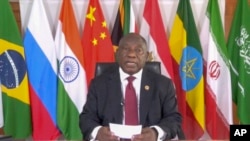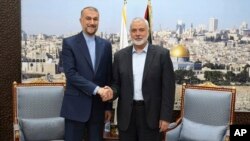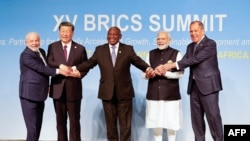Pretoria hosted a virtual meeting of BRICS -- a group of major emerging economies that includes Brazil, Russia, India, China and South Africa -- aimed at drawing up a common response to the Israel-Hamas conflict.
"We called for an immediate, durable, and sustained humanitarian truce leading to a cessation of hostilities," the group said in a summary of the meeting.
"We reiterated our strong support for regional and international efforts aimed at achieving an immediate cessation of hostilities, ensuring the protection of civilians and the provision of humanitarian aid."
Fighting has raged in Gaza after Hamas gunmen killed around 1,200 people, mostly civilians, during cross-border raids on October 7 -- the deadliest attack in Israel's history.
In retaliation, Israel launched a relentless bombing campaign and ground offensive in Gaza, which is ruled by Hamas.
According to Hamas, the war has killed more than 13,300 people, thousands of them children.
"The collective punishment of Palestinian civilians through the unlawful use of force by Israel is a war crime. The deliberate denial of medicine, fuel, food and water to the residents of Gaza is tantamount to genocide," said South African President Cyril Ramaphosa.
On Tuesday, Hamas leader Ismail Haniyehsaid a truce agreement with Israel was in sight, with mediator Qatar adding negotiations to free hostages seized by the Palestinian Islamist group were at their "closest point" to a deal.
Leaders and representatives of BRICS said a long-term diplomatic solution to the Palestinian-Israeli conflict was needed to ensure peace, with Chinese President Xi Jinping calling for an "international peace conference" to achieve that goal.
"There can be no sustainable peace and security in the Middle East without a just solution to the question of Palestine," Xi said, speaking through an interpreter.
'Barbaric acts'
China has historically been sympathetic to the Palestinians and supportive of a two-state solution to the Israeli-Palestinian conflict.
And it has this year sought to play a greater role in the Middle East, facilitating a historic rapprochement between Saudi Arabia and Iran and sending an envoy to the region to push for a ceasefire in the Israel-Hamas conflict.
BRICS, an acronym for its member countries, sees itself as a counterweight to the US and Western-led global order.
Describing Hamas's attacks and hostage taking as "barbaric acts" Brazil's President Luiz Inacio Lula da Silva said they did "not justify the use of indiscriminate and disproportionate force against civilians."
Russian President Vladimir Putin, who has accused the West of stoking tensions in the Middle East and criticised Israel for its conduct in the conflict, said a "long-term and sustainable ceasefire" was key to "prevent other states from being drawn into the war."
'Two state solution'
"The concerns of the Palestinian people must be addressed in a serious and sustainable manner, this can only happen with the two-state solution that is based on peaceful coexistence," said India's foreign minister Subrahmanyam Jaishankar.
Representatives from Saudi Arabia, Argentina, Egypt, Ethiopia, Iran and the United Arab Emirates -- countries that are all due to join BRICS in January 2024 -- were also invited to the talks.
South Africa has long been a vocal supporter of the Palestinian cause, with the ruling African National Congress (ANC) party often linking it to its own struggle against apartheid.
Earlier this month, it recalled all its diplomats from Israel and last week it joined four other nations in calling for an International Criminal Court investigation into the conflict.
On Monday, Israel's foreign ministry said it had also recalled its ambassador to Pretoria for consultations.
The summit came as a delegation of foreign ministers of the Palestinian Authority, Indonesia, Egypt, Saudi Arabia and Jordan hold talks this week on the conflict.











Forum